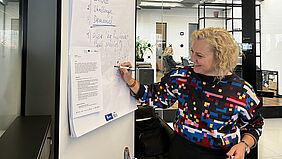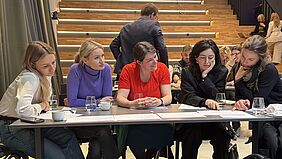Developing sustainable business ideas for the rural Lithuanian area of Rietavas was the main objective of the third design sprint if the T.A.B.-project held in April in Vilnius by the T.A.B.-project. Hochschule Wismar as leader of the work package on Citizen Dialog supported business development. Dr. Laima Gerlitz, Head of the European Project Center at Hochschule Wismar, played a big part in the development of a Co-Working Space in the town of Rietavas in Lithuania. Potential insights might cross-fertilise strategic development of co-working spaces in Wismar and the surroundings, making science-business cross-border collaboration feasible.
The establishment of a creative summer camp was the topic, research associate Geertje Wehry took part in. The knowledge about the creative- and culture industries gathered in the process of this and other projects provided useful insights in the process. In the same group graphic designer Anna Pfau from Wismar, took part as well. The graphic designer was invited to the program by Hochschule Wismar as part of the SMEs. As SME Anna Pfau gained not only knowledge and useful contacts during the design sprint itself, but also during the upscaling course that was provided on the day before on soft skills as well as on the movie about the Lithuanian painter and composer Mikalojus Konstantinas Čiurlionis. Participants came from Denmark, Sweden, Poland, Germany and of course Lithuania. Besides representants of municipalities and politicians even representants of the lithuanian ministry of the interior, that were responsible off the decision for the project in the South Baltic-Interreg-program.
The meeting in Vilnius connected well to the aim of the project to increase expertise, knowledge transfer and cooperation with businesses through the interdisciplinary networking of the fields of technology, art and business. In particular, the approaches, competences and skills of the Cultural and Creative Industries (CCIs) will be used to develop new value creation paradigms in different sectors. Cooperation is essential to achieve common goals and to enable European regions to effectively address regional and sectoral challenges together.
The aim of the T.A.B. project is to create international, cross-sectoral platforms to establish transnational cooperation links between regional and national economic and cultural sectors. The approaches, competences and skills of the Creative and Cultural Industries (CCIs) are fundamental to the development of new value paradigms in various sectors.
These effects can already be seen in the way businesses communicate. New forms of aesthetics, web presence and storytelling campaigns are important applications that the creative world can contribute to. Last but not least, AI will play an increasing role. And stay tuned, maybe the next co-working space and culture camp is just around the corner in Wismar.


